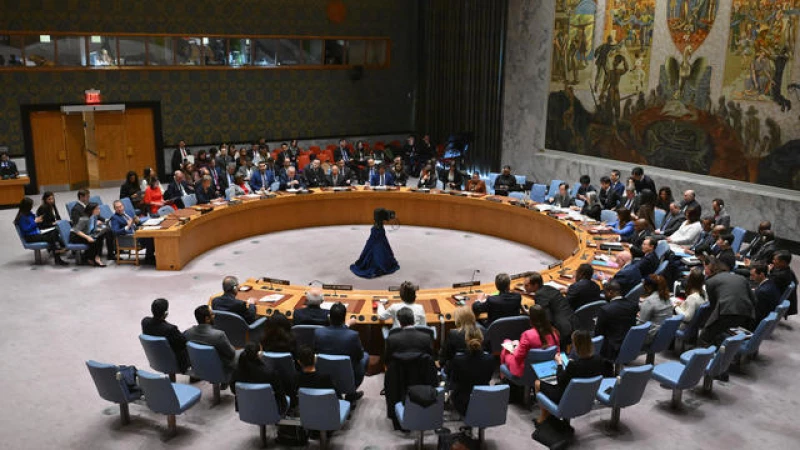The United Nations Security Council on Monday demanded a cease-fire in Gaza during the Muslim holy month of Ramadan, its first demand to halt fighting. The United States abstained on the resolution, which also demanded the release of all hostages taken captive during Hamas' Oct. 7 surprise attack in southern Israel. But the measure does not link that demand to the cease-fire during Ramadan, which ends April 9.
The vote comes after Russia and China vetoed a U.S.-sponsored resolution Friday that would have supported "an immediate and sustained cease-fire" in the Israeli-Hamas conflict.
The United States warned that the resolution approved on Monday could hurt negotiations to halt hostilities by the U.S., Egypt and Qatar, raising the possibility of another veto, this time by the Americans.
The resolution, put forward by the 10 elected council members, is backed by Russia and China and the 22-nation Arab Group at the United Nations.
A statement issued Friday night by the Arab Group appealed to all 15 council members "to act with unity and urgency" and vote for the resolution "to halt the bloodshed, preserve human lives and avert further human suffering and destruction."
The Arab Group has emphasized the urgent need for a cease-fire, stating that "It is long past time for a cease-fire."
A demand for a two-week cease-fire has been put forward, timed to coincide with the upcoming end of Ramadan. The draft proposal suggests that this temporary pause in fighting should ultimately lead to "a permanent sustainable cease-fire."
Despite the ongoing conflict, the Security Council has issued two resolutions addressing the deteriorating humanitarian crisis in Gaza, but none have specifically called for a cease-fire.
According to the Gaza Health Ministry, over 32,000 Palestinians in Gaza have lost their lives since the beginning of the war. The agency's data does not distinguish between civilians and combatants, noting that women and children account for two-thirds of the casualties.
Ambassador Linda Thomas-Greenfield of the United States raised concerns about the resolution's impact on delicate diplomacy in the region. She warned the council that the text "fails to support sensitive diplomacy in the region. Worse, it could actually give Hamas an excuse to walk away from the deal on the table."
"We should not move forward with any resolution that jeopardizes the ongoing negotiations," she said, warning that if the diplomacy isn't supported, "we may once again find this council deadlocked."
"I truly hope that that does not come about," Thomas-Greenfield said.
The United States has vetoed three resolutions demanding a cease-fire in Gaza, the most recent an Arab-backed measure on Feb. 20. That resolution was supported by 13 council members with one abstention, reflecting the overwhelming support for a cease-fire.
Russia and China vetoed a U.S.-sponsored resolution in late October calling for pauses in the fighting to deliver aid, the protection of civilians and a halt to arming Hamas. They said it did not reflect global calls for a cease-fire.
They again vetoed the U.S. resolution Friday, calling it ambiguous and saying it was not the direct demand to end the fighting that much of the world seeks.
The vote became another showdown involving world powers that are locked in tense disputes elsewhere, with the United States taking criticism for not being tough enough against its ally Israel, even as tensions between the two countries rise.
A key issue was the unusual language in the U.S. draft. It said the Security Council "determines the imperative of an immediate and sustained cease-fire." The phrasing was not a straightforward "demand" or "call" to halt hostilities.
Before the vote, Russia's U.N. Ambassador Vassily Nebenzia said Moscow supports an immediate cease-fire, but he criticized the diluted language, which he called philosophical wording that does not belong in a U.N. resolution.
He accused U.S. Secretary of State Antony Blinken and U.S. Ambassador Linda Thomas-Greenfield of "deliberately misleading the international community" about calling for a cease-fire.
"This was some kind of an empty rhetorical exercise," Nebenzia said. "The American product is exceedingly politicized, the sole purpose of which is to help to play to the voters, to throw them a bone in the form of some kind of a mention of a cease-fire in Gaza … and to ensure the impunity of Israel, whose crimes in the draft are not even assessed."
China's U.N. ambassador, Zhang Jun, said the U.S. proposal set preconditions and fell far short of expectations of council members and the broader international community.
"If the U.S. was serious about a cease-fire, it wouldn't have vetoed time and again multiple council resolutions," he said. "It wouldn't have taken such a detour and played a game of words while being ambiguous and evasive on critical issues."
Friday's vote in the 15-member council was 11 members in favor and three against, including Algeria, the Arab representative on the council. There was one abstention, from Guyana.
Following the vote, Thomas-Greenfield criticized Russia and China for blocking the resolution for what she called "deeply cynical reasons." She argued that they were unwilling to condemn Hamas' terrorist attacks in southern Israel on Oct. 7, which the resolution aimed to address for the first time.
She also pointed out a "petty" motive behind their veto, stating that "Russia and China simply did not want to support a resolution proposed by the United States, preferring to see us fail rather than the council succeed." Thomas-Greenfield accused Russia of prioritizing "politics over progress" and criticized their actions in Ukraine earlier this year.
The resolution marked a departure for the United States, which has faced opposition from many countries, including allies of Israel, advocating for an immediate end to the conflict.
Previous resolutions from the U.S. had tied calls for a cease-fire with demands for the release of Israeli hostages in Gaza. While this resolution still connected the two issues, the language used allowed for more interpretation and flexibility.







